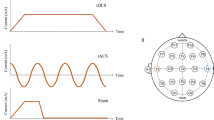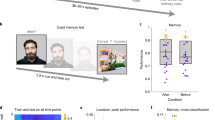Abstract
AMNESIC agents, such as electroconvulsive stimulation, can cause loss of memory for events that occurred before treatment1. Usually as the interval between learning and convulsive treatment is increased, the resulting retrograde amnesia is diminished1–3. This temporal gradient of retrograde amnesia can sometimes cover several years4. Clinical descriptions of the amnesic syndrome suggest that information about the temporal sequence of events can be more severely impaired than other aspects of memory5,6. Thus, an amnesic patient may describe a past event accurately but be unable to report when the event occurred. We have administered a new remote memory test based on former one-season television programmes to psychiatric patients receiving bilateral electroconvulsive therapy (ECT), and report here that memory for temporal order is markedly affected by ECT. ECT caused retrograde amnesia for order information about programmes broadcast from 1 to ∼7 yr before treatment, but not for programmes broadcast from 8–;17 yr before treatment.
This is a preview of subscription content, access via your institution
Access options
Subscribe to this journal
Receive 51 print issues and online access
$199.00 per year
only $3.90 per issue
Buy this article
- Purchase on Springer Link
- Instant access to full article PDF
Prices may be subject to local taxes which are calculated during checkout
Similar content being viewed by others
References
Memory Consolidation (edit. by McGaugh, J. L., and Herz, M. M.) (Albion, San Francisco, 1972).
Deutsch, J. A., A. Rev. Psychol., 20, 85 (1969).
Squire, L. R., in Short-Term Memory (edit. by Deutsch, D., and Deutsch, J. A.), 1–40 (Academic, New York, 1975).
Squire, L. R., Slater, P. C., and Chace, P. M., Science, 187, 77–79 (1975).
Williams, M., and Zangwill, O. L., Jl ment. Sci., 96, 484–493 (1950).
Van Der Horst, L., Mschr. Psychiat. Neurol., 83, 65 (1932).
Squire, L. R., and Slater, P. C., Jl exp. Psychol., 104, 50–54 (1975).
Squire, L. R., Chace, P. M., and Slater, P. C., Psychol Rep., 37, 223–234 (1975).
Squire, L. R., Neuropsychologia, 13, 51–58 (1975).
Seltzer, B., and Benson, D. F., Neurology, 24, 527–530 (1974).
Russell, W. R., and Nathan, P. W., Brain, 69, 280 (1946).
Barbizet, J., Human Memory and Its Pathology (Freeman, San Francisco, 1970).
Ribot, T., Diseases of Memory (Appleton, New York, 1882).
Sanders, H., and Warrington, E. K., Brain, 94, 661 (1971).
Squire, L. R., Neuropsychologia, 12, 429–435 (1974).
Warrington, E. K., and Sanders, H. I., Q. Jl exp. Psychol., 23, 432–442 (1971).
Author information
Authors and Affiliations
Rights and permissions
About this article
Cite this article
SQUIRE, L., CHACE, P. & SLATER, P. Retrograde amnesia following electroconvulsive therapy. Nature 260, 775–777 (1976). https://doi.org/10.1038/260775a0
Received:
Accepted:
Published:
Issue Date:
DOI: https://doi.org/10.1038/260775a0
This article is cited by
-
Photobiomodulation prevents PTSD-like memory impairments in rats
Molecular Psychiatry (2021)
Comments
By submitting a comment you agree to abide by our Terms and Community Guidelines. If you find something abusive or that does not comply with our terms or guidelines please flag it as inappropriate.



